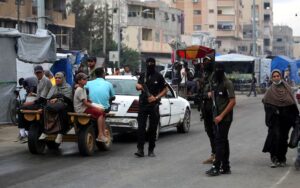Le Parisien: Story of reserve soldiers who refuse to return to the Israeli army

The French Le Parisien newspaper reported that while the wars on Gaza and Lebanon negatively impacted the lives of Israelis in general, they particularly affected the lives of reserve soldiers, including Shaked, with whom the newspaper’s correspondent in Tel Aviv, Anissa Hamadi, spoke.
Hammadi quoted Shaked, the soldier, as saying that he had many doubts following the October 7, 2023, attack, but that he had been unable to talk to anyone about them.
“I felt it was dangerous to express my doubts,” Shaked explained, because the anger following the attack was so intense.
According to the report, Shaked was working near the Lebanese border, and for the past two years, he had been rotating between two units, one as an engineer and the other as a nurse.
He spoke to the French newspaper, explaining that an officer had unequivocally told them in September 2024 that the objective of the exercise they were undergoing was to “evacuate Shiite villages in southern Lebanon,” meaning to destroy buildings to make it impossible for residents to return.
Frankly, he told Le Parisien, he decided to desert the service, adding, “I was afraid my friends would hate me and label me a traitor”.
He says he joined the refuzniks (Soldiers for Hostages) group, emphasizing that the goal was to tell soldiers: You aren’t traitors if you refuse orders.
The group has only about 400 members, out of 400,000 reserve soldiers, but Shaked says tens of thousands of soldiers are unable to take a stand for fear of letting down their comrades in arms.
Reserve soldier Shaked explains that he never received an order to shoot at civilians, but he spoke of a more subtle approach, explaining, “When ministers say there are no innocent people in Gaza, for example, that influences the soldiers’ decisions”.
The French newspaper quoted the Israeli army as saying that since November 2024, it has been able to rely on only 75% to 85% of its reserve soldiers, compared to 100% at the beginning of the war.
Shaked was keen to clarify that he isn’t against the war, but rather opposes the way it’s being conducted, emphasizing that the army must fight professionally and respectfully, and abide by the law.
Le Parisien newspaper revealed that Yotam Falik, spokesman for the “Soldiers for Hostages” association, was expelled from the army for criticizing government policy.
He was quoted as saying that he was surprised with each passing day that the government had lost all elements of decency.
He continued that he never received an order to shoot civilians, but spoke of a more subtle approach, explaining, “When ministers say there are no innocent people in Gaza, for example, it influences the soldiers’ decisions… They don’t even care about my life”.
As for Yotam, there are thousands of reserve soldiers who no longer respond to call-ups, commenting on this by saying, “The army is in a deep crisis”.
Le Parisien reported that another group, “Reservists to End the War,” was formed in Israel in response to the invasion of Gaza City.
The group, which has approximately 600 members, condemns the security and economic costs Israel incurs as a result of a protracted war.
The French newspaper quoted Raphael Bicach, a 26-year-old French-Israeli NCO and member of the “Reservists for Ending the War” group, as saying that the group received support from Israeli public opinion to end the war.
For his part, Yotam Vilk explained to Le Parisien that the physical and mental fatigue of reserve soldiers over the past two years is an issue fueled by the government through its policies.
He continued, “I don’t know how we will fix Gaza… Human lives are something that can never be restored”.





